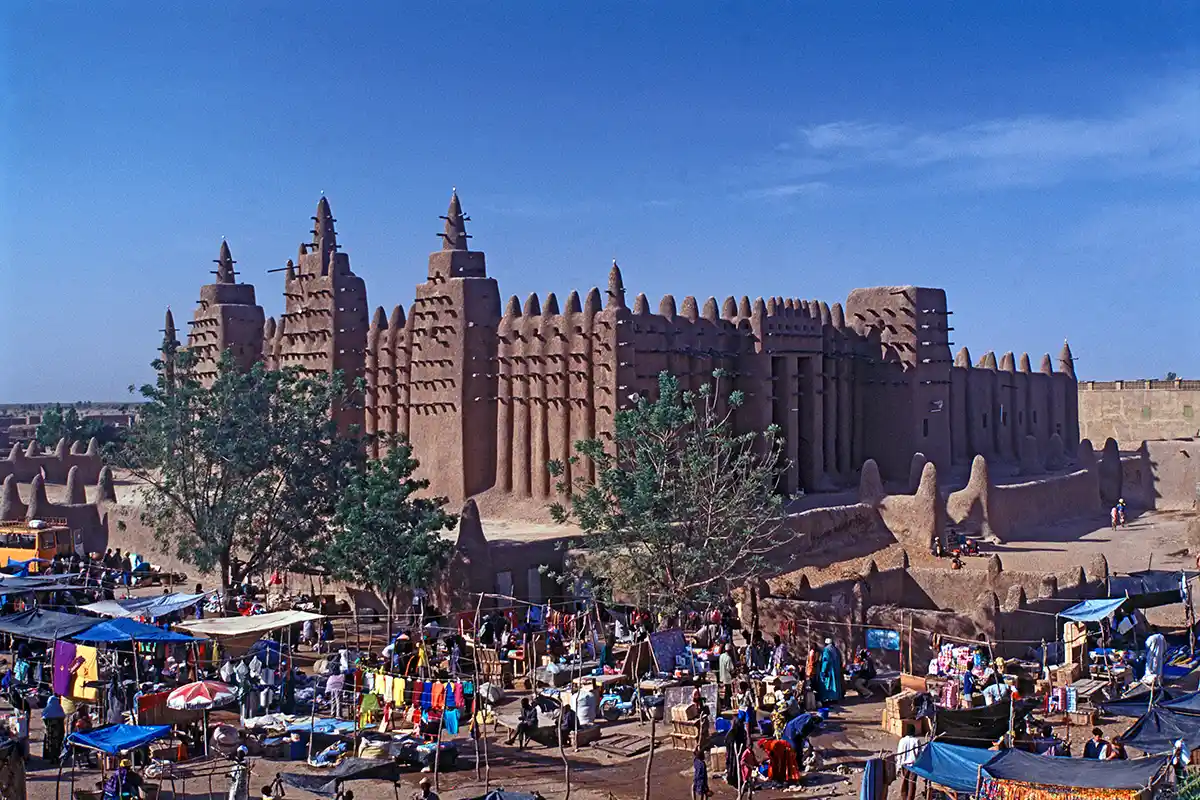Sacred Sites of Mali
Mali: A Journey Through Sacred Sites and Spiritual Heritage
Mali, a West African nation with a rich cultural tapestry, offers a fascinating exploration of sacred sites. From ancient cliff dwellings imbued with ancestral significance to grand mudbrick mosques representing centuries of Islamic legacy, Mali's religious landscape provides a window into both past and present spiritual practices.
Dogon Country: Land of Ancestors and Cosmology
The Bandiagara Escarpment, a UNESCO World Heritage Site, is the heartland of the Dogon people. This sandstone cliff region features villages seemingly hanging in space, ancient cave dwellings, and intricate masks used in ancestral ceremonies. The Dogon beliefs focus deeply on a profound connection to the land and ancestral reverence. These sites, where both daily life and ritual merge, are revered as conduits between the present and the ancestral realm. The Togu'na, a low-ceilinged communal space in Dogon villages, serves as both a gathering place and a sacred space for conflict resolution and spiritual guidance.
Djenné: Center of Islamic Scholarship and Architectural Masterpiece
The legendary city of Djenné is synonymous with its iconic Grand Mosque, one of the most renowned examples of Sudano-Sahelian mudbrick architecture in Africa. Serving as a hub of Islamic learning and scholarship for centuries, this mosque remains an active place of worship. Its annual plastering festival combines sacred significance and communal effort. Beyond the Grand Mosque, Djenné features numerous smaller mosques and historic homes, demonstrating a legacy of traditional Islamic architecture and urban planning.
Ancient Sites of the Niger River Bend
Throughout Mali, particularly along the Niger River, archaeological sites reveal traces of earlier religions and belief systems. Tumuli (burial mounds) and ruins of older settlements attest to thriving kingdoms predating the Malian Empire's era. While some precise meanings might be lost, these relics hint at the spiritual landscapes of Mali's ancestors, adding layers of complexity to the nation's religious and cultural past.
Islamic Sites in Timbuktu
The legendary city of Timbuktu, though tragically impacted by political conflict, boasts an enduring legacy of Islamic learning. Historical mausoleums of Islamic saints and the famed Sankore Mosque underscore Timbuktu's pivotal role in West African Islam. These sites remain important for pilgrims, though many require extensive restoration to fully reclaim their former glory.
Contemporary Religion and Coexistence
Mali's population predominantly follows Islam, yet vibrant expressions of animist and traditional beliefs persist, particularly in rural areas. Traditional masks, festivals, and oral histories reveal an intertwining of pre-Islamic practices with subsequent theological influences. Smaller religious communities also contribute to Mali's religious diversity. Though not without historical complexities, modern Mali showcases a unique coexistence of traditions.
Mali's sacred spaces encompass diverse expressions of faith, from intricate masks used in Dogon rituals to the towering structure of the Djenné Grand Mosque. In its many historical layers and evolving expressions of faith, Mali exemplifies West Africa's vibrant religious landscape and the importance of safeguarding its rich heritage.
Important Note:
Mali's political situation remains unstable and can pose concerns for travelers. Even if physical visitation is currently challenging, learning about these sacred sites can offer a meaningful way to appreciate Mali's profound cultural and spiritual legacy.

Martin Gray is a cultural anthropologist, writer and photographer specializing in the study of pilgrimage traditions and sacred sites around the world. During a 40 year period he has visited more than 2000 pilgrimage places in 160 countries. The World Pilgrimage Guide at sacredsites.com is the most comprehensive source of information on this subject.

